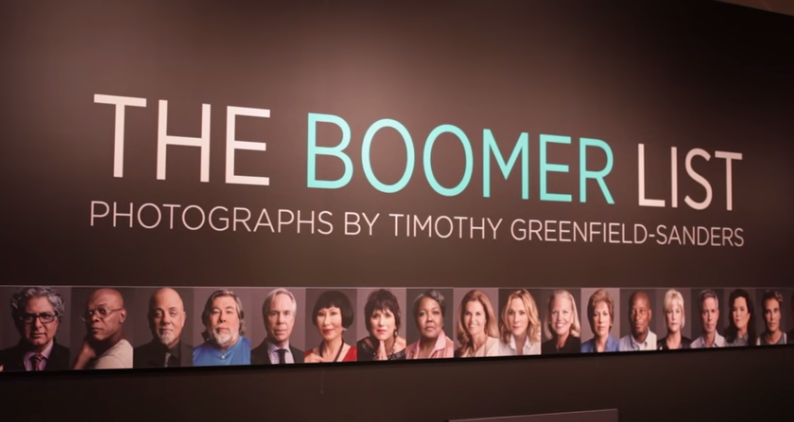Happy Monday, all! Anyone else feeling a little bleary-eyed and delirious after binge watching “House of Cards” in a dark room all weekend? No? Just me? Okay.
Before locking myself in a room with nothing but my Netflix account and some sustenance to make it through the weekend, I actually did venture out into the world to do something fun on Friday: I went to the Newseum.
If you’re unfamiliar, the Newseum is an interactive museum experience in D.C. that shows the history of news-making and gives behind-the-scenes looks at news coverage of major historical events. If you’re ever in D.C. with a day off and a hankering to do some reading, I really recommend it. Anyway, back to my point. At the Newseum, I saw a neat exhibit: The Boomer List.
The Boomer List is a series of photographs by Timothy Greenfield-Sanders featuring influential baby boomers born from 1946 to 1964. Greenfield-Sanders selected one boomer from each year of the boom who reflects “the depth, diversity and talent of their generation.” The 19 photograph subjects include authors, artists, athletes and activists.
In the government universe, boomers are also engineers, managers, planners, analysts, assistants, and just about any other role you can think of. Boomers are the ones who know the ins and outs of our organizations. They have so much knowledge about systems, processes and operations accumulated over years of learning and doing. They have connections. They know who to talk to and how to talk to them to get things done. Presently, boomers aren’t too hard to spot in our offices. A few years from now that won’t be the case.
The idea of knowledge transfer isn’t a new one. It has been a hot topic in recent years as organizations ready themselves for the big Baby Boomer Retirement Brain Drain. Workforce planning is a constant concern, but when the boomers go, the information they will take with them could be substantial if we don’t plan for it well.
Hence, Booms-day Prepping.
I’m not sure how many of you have seen the show “Doomsday Preppers” on the National Geographic Channel, but it’s a program that “explores the lives of otherwise ordinary Americans who are preparing for the end of the world as we know it.” And it is fascinating. These people spend a ton of time and money developing escape routes, building defense mechanisms and shelters, and devising ways to survive any number of natural and man-made disasters.
Regardless of how likely or unlikely the occurrence of these “end times” scenarios preppers are uh… preparing for, organizations would be well-advised to take a page out of their book.
These people are getting something right. They have Plan A. Heck, many of them have Plan B, Plan C and Plan D ready to go. And what’s more, they communicate those plans to the people involved in successfully implementing them so that when the worst happens, everyone is ready to respond or act.
Can you think of anyone you work with whose retirement or separation from your organization would leave you struggling to get a job done?
Take a second to put it into the context of your job. How often do you go to another person for help or guidance on an issue? When a specific issue comes up, do you have times where you think “Oh, (fill in the blank) is the go-to person for that. I’ll send an email.” So you send your email but immediately get an automated “Out of Office” response. Your go-to person is on leave for a month. Does your project grind to a halt because there is no one else to answer your question?
If the answer to that question is “Yes” you need to start thinking or talking about knowledge transfer. It’s time to come up with a plan for your organization to develop employees to seamlessly fill key roles after baby boomers move on to retirement.
It’s not just about learning rules, regulations and processes; that type of knowledge is at least easy to transfer. It can be documented and shared through normal and easily accessible means. Someone just has to take the time to do it. But it’s also about building relationships with customers and making contacts in other organizations you can reach out to. Before the boomers leave, introductions need to be made and relationships need to be cultivated. This gives everyone involved a chance to build a rapport with a shared connection before the boomer makes his or her grand exit.
There are entire corporations out there whose mission is to help organizations plan for knowledge transfer. But I’m new to thinking about this and as such, I’m curious; what have your organizations done to ensure readiness to fill gaps in knowledge when boomers leave the office? What have you done to take it upon yourself to become a Booms-day Prepper?
Mackenzie Wiley is part of the GovLoop Featured Blogger program, where we feature blog posts by government voices from all across the country (and world!). To see more Featured Blogger posts, click here.





Leave a Reply
You must be logged in to post a comment.